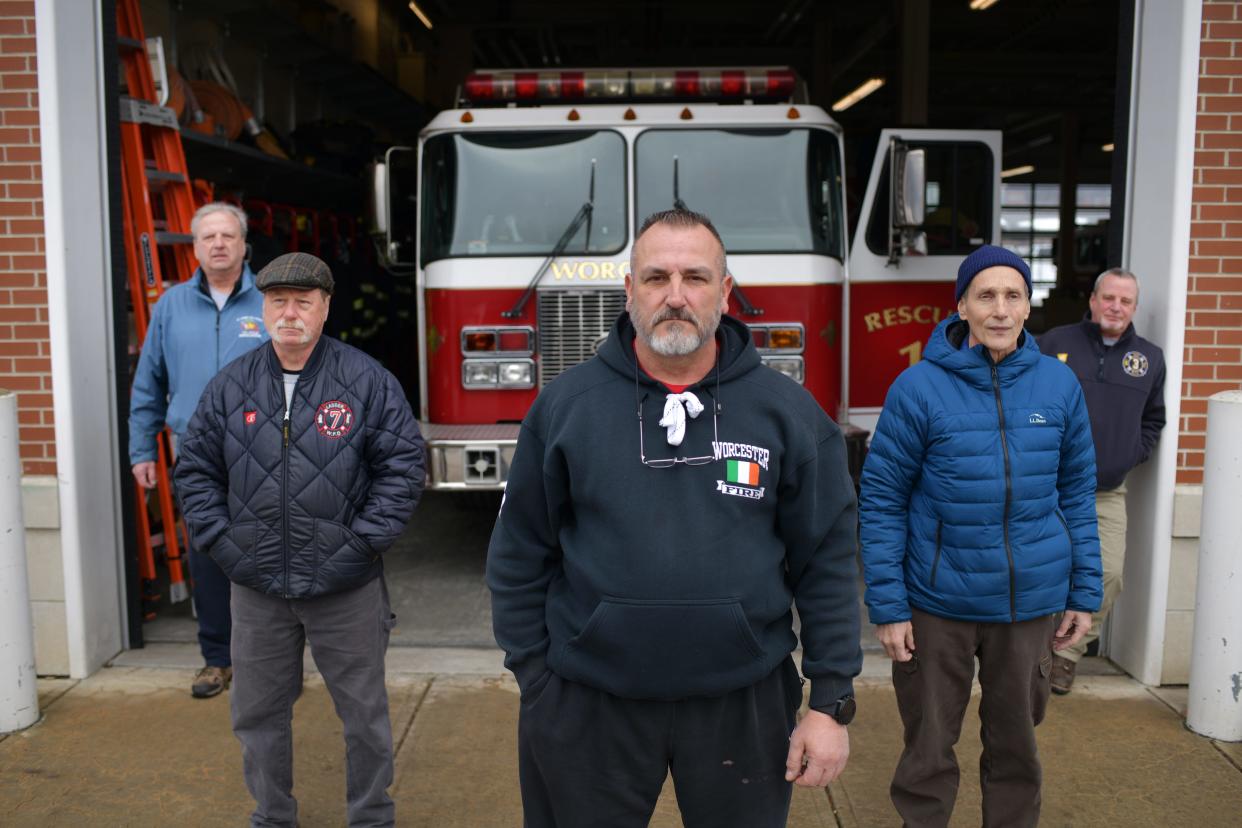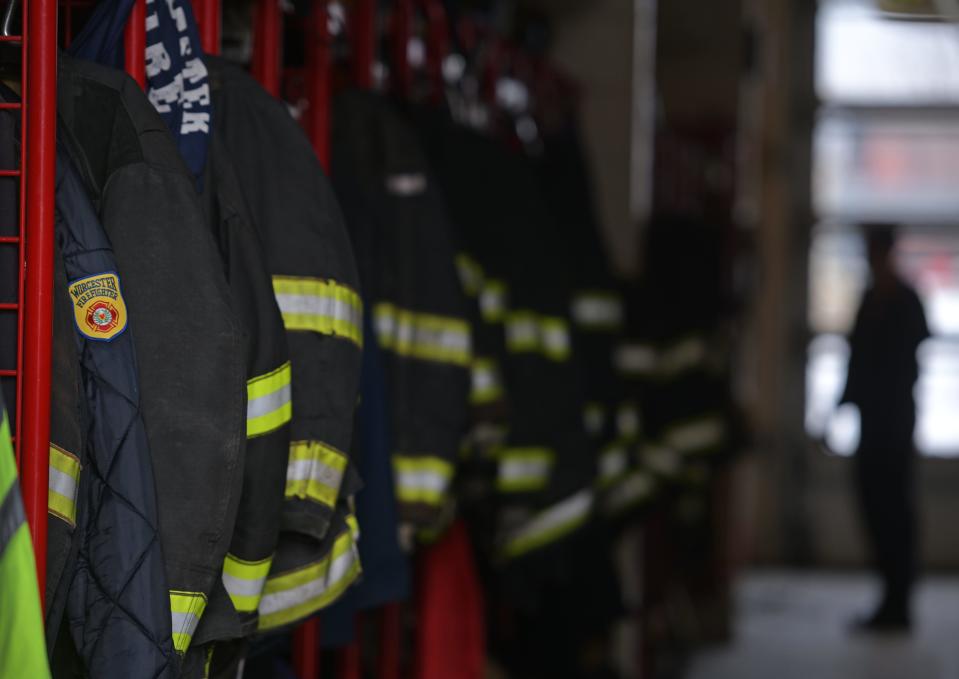Worcester firefighters with cancer file lawsuit against turnout gear makers, chemical giants

WORCESTER — Paul Berube, Paul Cotter and Mark Whalen spent decades training for and avoiding hazards as Worcester firefighters.
They fought the same fires — sometimes in the same smoke-filled hallways — trusting their training, their gear and their instincts as danger raged around them.
“It’s a calculated risk,” Berube, a retired captain, said recently of the profession — a risk that, as firefighters in this city know all too well, is extremely serious.
All three men have stood in silence at the too-frequent wakes, funerals and commemorations for the colleagues who died on the job.
They’ve grappled with the pain of that loss, and accepted the possibility of their own sacrifice, in large part by telling themselves that this is what they signed up for.
“It’s a known risk,” Berube said, rattling off the possible disasters — chemical explosions, building collapses, flashovers — that he was able to train for, and, to some degree, accept.

Nowhere on the seemingly endless list of anticipated risks, however, was the protective gear designed to keep firefighters safe.
“No one ever told me I was taking a risk (by donning turnout gear),” Berube said, his voice rising.
Berube, Cotter and Whalen were all knocked off the force by cancer, the disease the country’s largest fire union says accounted for 66% of line-of-duty deaths from 2002 to 2019.
On Tuesday, the trio, along with seven other city firefighters diagnosed with cancer, filed a federal lawsuit alleging that so-called “forever chemicals” in their equipment caused their illnesses, and that the large corporations who sold the products are engaged in a "continuous and ongoing public deception" regarding their risks.
“We can’t run away from this,” said Berube, who, along with Cotter and Whalen, toiled and sweated in gear made with PFAS — short for polyfluoroalkyl and perfluoroalkyl substances — for decades.
Worcester firefighters are among thousands across the country who have long worn gear and used firefighting foam made with PFAS, a group of chemicals that have become a topic of national alarm.
According to the Environmental Protection Agency, exposure to “certain levels” of PFAS has been linked to an increased risk of a number of serious health conditions, including cancer.
The chemicals, which do not break down in nature, have leached into water supplies and bloodstreams across the world, leading to recent advisories, from Cape Cod to Maine, against eating fish or deer from certain towns.
The 10 Worcester firefighters filing suit — along with five firefighters from other Massachusetts departments, including Boston and Fall River — were recently confirmed by lab testing to have "significantly elevated" levels of PFAS in their blood, their lawsuit states.
According to a 2015 study conducted by the National Institute for Occupational Safety & Health, firefighters from three large U.S. cities had 14% more cancer deaths from 1950 to 2009 than would be expected in the general population.
The Worcester firefighters' lawsuit alleges that PFAS in their gear caused their cancers, and that two dozen companies that manufactured or used PFAS engaged in negligence by failing to warn departments of the dangers they allege the gear poses.
“How many years has it been that you buy a pack of cigarettes, and it says, ‘This could kill you, stupid,' ” Berube asked, adding that no warning label was ever included on his turnout gear.
“We prepare for biologic, chemical, nuclear, terrorist hazards — besides three-deckers — and we get blindsided by this?”
'Ongoing concealment' alleged
The firefighters’ 78-page lawsuit, filed in U.S. District Court in Boston, names 25 chemical companies it says either manufactured or used PFAS in the making of firefighting foam or gear.
It is one of four lawsuits filed across the country Tuesday by Pritzker Levine LLP, a New York law firm that is representing firefighters who allege PFAS-related injuries.
The firm said it filed two suits in California state courts, as well as a federal lawsuit in New York on behalf of four FDNY firefighters.
The Worcester firefighters' lawsuit alleges the defendant companies exposed the firefighters to the chemicals, and that such exposure was a “substantial factor and proximate cause” of their cancer and related complications.
The 10 city firefighters in the lawsuit — Berube, Cotter, Whalen, William Bernhard, Lt. Michael Clark, Lt. David Ford, Kevin Hartigan, Onslow James, Robert Pastor and Stephen Wilder — have a combined 302 years of service to the city.
All but one appear to be retired, based on descriptions offered in the lawsuit, and all 10 were diagnosed with prostate cancer.
The EPA identifies prostate cancer as one of three cancers — the others being testicular and kidney — that studies have indicated may be linked to exposure to "certain levels" of PFAS.
According to the suit, all 10 firefighters had either used or been exposed to firefighting foam over the course of their careers, and all routinely wore turnout gear.
The lawsuit alleges that defendants in the case failed to provide labels on the foam or turnouts identifying PFAS as being present, and have not warned firefighters of health risks associated with PFAS exposure.
It further alleges that the defendants have failed to list PFAS on safety sheets required by the Occupational Safety and Health Administration.
"The (sheets) provided with Defendants’ Class B foams did not — and to this day do not — state that these foams contain PFAS," the lawsuit alleges. "(The sheets) falsely stated that the Class B foams and/or their contents were not known carcinogens and did not cause birth defects."
The lawsuit alleges the companies were negligent, broke consumer protection laws and have engaged in "active and ongoing concealment of the true nature of the hazardous toxicity, persistence and bioaccumulation associated with the use of PFAS."
Suspicion began locally
While the lawsuit is freshly filed, and lawyers for defendants have yet to be entered in court records, many of the companies have fought similar allegations in other lawsuits.
The culprit of increased cancer risk in firefighting has traditionally been considered to be smoke and chemical inhalation at fires.

The idea that PFAS in firefighting products could play a role was developed largely as a result of a lengthy investigation that Diane Cotter, Paul Cotter’s wife, launched following his diagnosis.
Before PFAS concerns exploded within the last year, Diane had focused on the chemicals following consultation with the famed Erin Brockovich and research into environmental concerns in the Midwest.
An Ohio lawyer, Robert A. Bilott, first unearthed concerns about PFAS during a lawsuit into mysterious cow deaths in West Virginia in the 1990s.
His lawsuit, chronicled in the Hollywood movie “Dark Waters,” led to realizations that PFAS from factories had been dumped into the water supply of thousands of people.
A court-approved medical study that flowed from Bilott's lawsuits linked the presence of PFAS in water to a range of health concerns, including cancer.
Diane Cotter, after researching the chemicals, succeeded in commissioning a peer-reviewed study that found high levels of PFAS in turnout gear that researchers deemed a “possible” exposure pathway.
The Cotters, who told their story in detail to the Telegram & Gazette in November, are concerned that PFAS in turnout gear passes into firefighters’ bodies, increasing their risk of disease.
The suggestion that PFAS — which was in the gear to help it withstand heat, moisture and hazardous substances from reaching the skin — might itself be hazardous is a recent development.
While the nation’s largest fire union, which often took sponsorships from chemical giants, dismissed that idea for years, it has, under new leadership, embraced the concern and now opposes the use of PFAS in gear.
In their lawsuit, the Worcester firefighters allege that many of the defendants issued misleading or false statements about PFAS that were initially parroted by the IAFF, which, it noted, had accepted sponsorships from those companies, including for an annual cancer summit.
The lawsuit alleges that gear companies' products were, all the while, harming firefighters, and advisories they issued to frequently wash turnout gear could have placed family members at risk.
"(Washing instructions) do not advise that turnouts should be washed in a commercial extractor to prevent cross-contamination and PFAS-exposure to family members who handle or wash the turnouts with other garments in home washing machines," the lawsuit states.
Suit likely bound south
The Massachusetts firefighters’ lawsuit is the latest in a string of similar suits filed across the county — some by firefighters, others by civilians — many of which are being combined into a large, ongoing federal lawsuit regarding PFAS in federal court in South Carolina.
Many of the legal rulings and precedents are expected to be set in that process, which is called multidistrict litigation.
Lawyers for Pritzker Levine, the New York law firm representing the Massachusetts firefighters, said they expect the lawsuit filed Tuesday to be sent to South Carolina.
It would then eventually be sent back to Massachusetts for resolution following legal rulings in the larger case.
Interviewed recently via Zoom for this story, Berube and Whalen said they joined the lawsuit because they want answers about what they’ve gone through, and believe the companies need to be held accountable.
“There has to be consequences,” Berube said, adding that he believes he is “paying the consequences of their products.”
Whalen said the notion that he could have been unwittingly sickened by the gear meant to save him is particularly egregious.
“The last thing you would need to find out, after 32 years of going into areas most people would never go into without the gear we wear, is that the gear (may) be the worst part,” he said.
'It was in my bones'
Whalen, like many other city firefighters, regrets nothing about his career choice, even with the benefit of hindsight.
A Worcester native who came from a family of teachers, he signed onto the job in his late 20s and fell in love with the camaraderie he always experienced at the firehouses he staffed.
“I was always at big stations — guys goofing around all the time,” he said. “But when the bell hit, everybody got serious, and went and did their job.”

The hardest-ever job for Whalen came not during a fire but after it. He was part of a small group of firefighters who created a committee and handled burials for the six men who perished in the Worcester Cold Storage and Warehouse Co. fire in 1999.
“We got it done,” he said as he described those difficult days, pausing several times to clear his throat.
He smiled as he spoke of his career highlight — the call in which he delivered a baby inside of a home.
The initial call was hampered because of a language barrier, he recalled, but when he got there, he chuckled, “You knew what was going on.”
Whalen, 60, lives in Leicester with his wife, with whom he raised two children. He retired from the job last March following his diagnosis.
Whalen said his prostate numbers, which had been going up for some time, reached concerning levels in 2020, and he ultimately made the call to remove the organ.
“It ended up being the right move,” he said, recalling how his surgeon said the lining was getting thin and “could have broken out.”
For Berube, 67, of Millbury, the road to recovery was a longer one. His cancer was stable for a time, but then all of a sudden became very aggressive, taking a turn he said baffled his doctors at Dana-Farber Cancer Institute.
“It was behaving the way it usually does in most men, until it didn’t,” he said, adding his experienced doctors said they couldn’t explain the sudden turn.
Berube, all of a sudden, had Stage 4 metastatic cancer and was in the fight of his life.
“It was in my bones, my lymph nodes and spreading,” he said. He underwent two years of treatment including “extensive” surgery, chemotherapy and radiation.
The 36-year fire department veteran is stable now — “Dana-Farber saved my life,” he says — but, along with other survivors of the disease, forever changed.
Prostate cancer and its treatment can cause a host of unpleasant side effects including infertility, incontinence and sexual problems.
“You’re injured forever,” Berube said as Whalen nodded. He said he’s concerned about how many firefighters across the country have been similarly hurt.
“You’re just touching the tiniest amount of the fire service (in Worcester).” he said. “This is big.
“We probably don’t know exactly how many guys before us suffered because of this."
While most of the plaintiffs in the lawsuit are firefighters, one is the wife of an active-duty Boston firefighter.
The lawsuit states that the woman was deprived of "love, companionship, comfort, care, assistance, protection, affection, society, moral support, sexual relations and conjugal fellowship," and that such deprivation has caused and will continue to cause emotional distress.
Companies question claims
The companies that have created and used PFAS for decades, including chemical giants DuPont and 3M, have pushed back against allegations regarding their products.
As the lawsuit notes, 3M writes on its website that the "weight of scientific evidence from decades of research does not show that PFOS or PFOA" — two types of PFAS — "causes harm in people at current or past levels."
DuPont, on its website, states that "uncertainty with regard to their human health effects remain," providing visitors with links to several related government studies.
DuPont and 3M have yet to file a legal answer to a similar lawsuit Pritzker Levine filed on behalf of firefighters in California last year, court records show.
Proving a person’s cancer is directly linked to one specific cause is not easy, and the scientist who conducted the PFAS study for Cotter, Graham Peaslee, agrees more research is needed.
“I hope there’s nothing there,” Peaslee, a Notre Dame nuclear physicist who found the PFAS using an advanced university asset — the St. Andre particle accelerator — told the industry magazine Fire Engineering in a recent podcast. “But what if this is causing cancer in the fire services?”
Peaslee told the T&G in November that more research is being done on just how much PFAS might pass from turnout gear or firefighting foam into skin.
His research indicated that just handling the gear caused PFAS to rub off on gloves, while dust from firehouses where gear was stored indicated the chemical could possibly be inhaled after degrading in air.
Gear manufacturers say their gear no longer contains legacy PFAS chemicals, instead using substitutes that don’t stay in the body as long.
Peaslee said the replacements have not been fully studied and may still be problematic for people continually exposed.
The firefighters' lawsuit alleges that, last October, the EPA found that one such substitute, "GenX," was "more toxic" than PFOA, the substance it was intended to replace.
Anticipating liability
The firefighters' lawsuit alleges that statements some of the companies it is suing have made defending their products are part of a lengthy effort to conceal dangers they knew or "should have known" the products could cause.
It noted that DuPont recently set aside $4 billion along with two of its spinoffs to handle future liability — an action it alleged amounted to an acknowledgment that PFAS has caused "significant harm" to humans and the environment.
DuPont was Bilott’s adversary during the West Virginia litigation. It ultimately agreed to more than $1 billion in settlements with those who drank the tainted water, including up to $235 million earmarked for medical monitoring and treatment of diseases linked to the chemicals.
It took Bilott years to pry documents from DuPont disclosing the existence of the chemicals and their toxic qualities.
He uncovered numerous documents he argued showed the company’s disregard for the safety of the public and its own workers in the name of profit.
Worcester firefighters said that history makes them even more suspicious about the corporations’ defenses.
"I would say there’s a degree of anger,” Berube said, adding he believes companies knew there was a risk but looked instead at the profit.
His voice rose, and his speech quickened, as he thought back on all the sweat that poured from his body onto his gear during fires.
“You work to the point of taking a ride in the ambulance — which I did numerous times, for dehydration — because you worked so hard, and you sweat, sweat, sweat,” he said. “It’s like being wrapped up in Saran Wrap with all your winter clothes on.”
As his voice rose to a crescendo of anger, another emotion evident was fear: Fear of cancer coming back, or of another cancer rising up.
“That stuff’s in my body,” he said. “We always have this looking over our shoulder.”
In Berube’s case, there are two shoulders to watch. His son is a third-generation city firefighter.
“Is my son going to suffer because of this?” Berube asked, his voice breaking. “My son is wearing his grandfather’s badge.
“He died of cancer,” he said of his father. “I almost did.
“Is he,” he said, stopping himself. “When does this end?”
In addition to 3M and DuPont, also listed as defendants in the suit are AGC Chemicals Americas, Amerex Corp., Archroma, Arkema, Buckeye Fire Equipment, Carrier Global Corp., Chemguard, Dynax Corp., Fire Dex LLC, Fire Service Plus, Globe Manufacturing Co., Honeywell Safety Products USA, Johnson Controls, Lion Group, Mine Safety Appliance Co., National Foam, PBI Performance Products, Perimeter Solutions LP, Stedfast USA, Tencate Protective Fabrics USA dba Southern Mills, The Chemours Co., Tyco Fire Products LP and W.L. Gore & Associates.
Contact Brad Petrishen at brad.petrishen@telegram.com. Follow him on Twitter @BPetrishenTG.
This article originally appeared on Telegram & Gazette: Worcester firefighters with cancer file lawsuit against gear, PFAS makers

